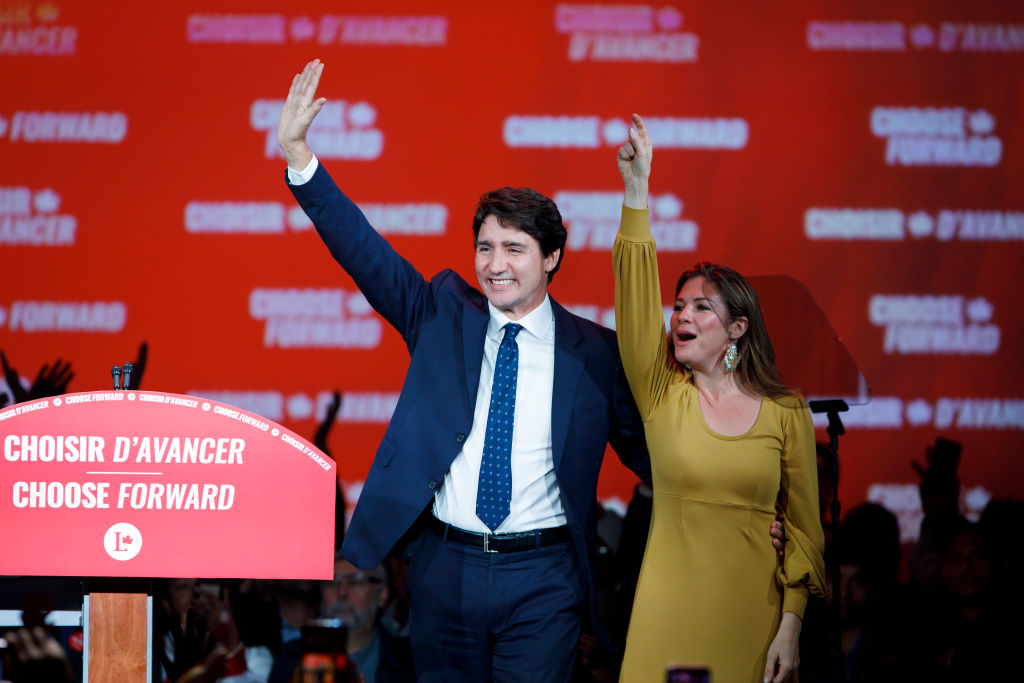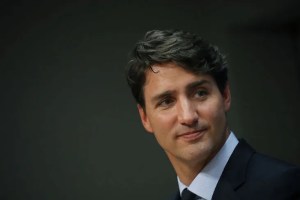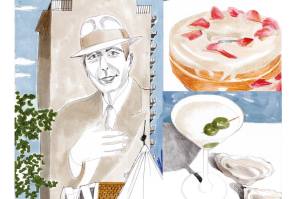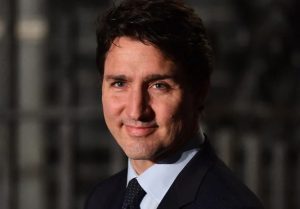‘I wonder if we can talk Trump into buying us.’
That wasn’t a disaffected Greenlander or an ambitious Eastern European president talking. It was someone from a place normally worried about outsized American influence — Canada.
Despite multiple scandals, including embarrassing brownface/blackface photos that surfaced during the campaign, Liberal prime minister Justin Trudeau held onto power in yesterday’s Canadian election, just barely. The American liberal consensus on the result was summed up by Neera Tanden, president of the Center for American Progress and an adviser to presidential candidate Hillary Clinton, who tweeted, ‘Benny Gantz forming the government in Israel and Trudeau and the Liberals winning the most seats is a sign that the wave of Trumpism has crested and the center-left alternative is rising.’
Perhaps. But that triumphant declaration ignores the popular vote, which Democrats in America haven’t stopped talking about since Clinton won it in 2016. In Canada yesterday, it was the conservatives who garnered the largest share of it, with over 34 percent. The Liberals’ 33 percent makes them the winner with the lowest share of the popular vote in Canadian history. They look to have lost 28 seats, going from a majority government to a minority with an estimated 156 out of 338 seats, and dropped 6.5 points in the popular vote. The New Democratic party, Canada’s main left-wing party, lost 20 seats. The Conservatives, meanwhile, went up 23, though with 122, they didn’t have a chance of forming a government. The separatist Bloc Quebecois had the biggest gains, going from 10 members of Parliament to 32. (Votes are still being counted.)
Might separatism become a live issue in Canada for the first time since the 1990s?
It wasn’t a disgruntled Quebecois, however, who wondered if the American president is interested in buying a province. It was an Albertan, and the day after the election, it was Western separatism that began trending on social media. ‘My Facebook news feed is filled with #wexit,’ a friend in Fort McMurray, Alberta, told me.
Every single riding in Alberta was won by the Conservatives, except one Edmonton district that voted NDP, and the Conservatives swept Saskatchewan, with the Liberals losing all their MPs in the two provinces — and two cabinet ministers in the process.
‘I am so disgusted with my country. Seriously that POS could shoot a school girl in front of thousands of people and the idiots would still vote for him,’ the first Albertan told me, speaking, of course, of Trudeau. ‘It doesn’t matter. Our votes in Alberta don’t matter at all. It’s fucking bullshit. And the east hates us but seems to love our money.’
That’s a reference to the fact that the oil industry, mainly based out of Alberta, took heavy fire during the campaign from climate-obsessed politicians, with Green party leader Elizabeth May even calling, as Pipeline News put it, ‘for the annihilation of the Canadian oilpatch.’ Alberta pays more into Confederation than it gets back, while the opposite is true of Quebec, to a great extent because of the thriving oil industry. Resentment in Western Canada wasn’t helped by the fact that the national news networks called the election for Trudeau before polls had even closed in some parts of the West.
‘While I will always be proud to be an Albertan I can say with certainty tonight I am no longer proud to be a Canadian,’ one resident of oil country wrote on Facebook. Another posted a picture of a ‘Republic of Western Canada’ passport.
Andrew Scheer’s Conservatives couldn’t persuade enough Canadians in the rest of the country to vote for his party. Trudeau is a youthful 47; Scheer is a baby-faced 40-year-old. When I covered the Canadian Conservative leadership race in 2017 that Scheer won for The Weekly Standard, a candidate told me that the best people in parliament declined to run because they thought Trudeau, who’d won a majority government just over a year before, was unbeatable. Justin doesn’t have the smarts or the wits of his father, Pierre, prime minister from 1968 to 1984, with a brief break in the middle, but as I wrote after the 2015 election, ‘even Calgary was susceptible to a second bout of Trudeaumania.’
No more. Justin Trudeau might have brought together a country beset from the beginning by regional fractures, but not for long. As scandal after scandal piled up — cabinet ministers resigned after allegations Trudeau pressured the justice minister to go easy on a Quebec company facing criminal charges — a number of those who served as cabinet ministers in Stephen Harper’s Conservative government must have been kicking themselves for missing the opportunity to dethrone the man liberal publications around the world dubbed the last great hope.



















